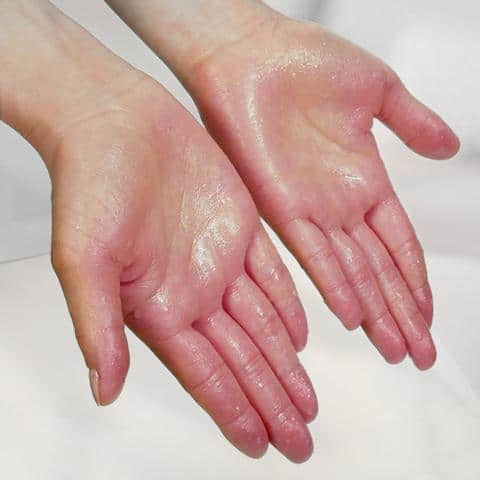
When you leave the house to meet your valentine, you’ll have enough to think about. You won’t want to think about sweat. A little nervous sweat can be manageable. But if you are prone to excessive sweating(hyperhidrosis), either in specific areas like your hands and underarms or over your entire body,don’t be without hope. You may notice you tend to sweat more than normal given the surrounding temperature, your activity level or stress. This kind of sweating can cause further stress and embarrassment.
Identifying Hyperhidrosis
Sweating is the body’s natural means of cooling itself off.Most times, the body releases sweat as a response to exercise, heat, anxiety or other environmental factors. Excessive sweating due to hyperhidrosis isn’t caused by heat, movementor stress. Hyperhidrosis has no obvious cause, but it can become so severe that it soaks through clothes and drips off hands. If excessive sweating has no underlying medical cause, it’s referred to as primary hyperhidrosis and can be hereditary. This occurs when the nervous responsible for triggering sweat glands doso without a prompt or beyond what is necessary. Given stress or nervousness, this can be exacerbated. If the sweating can be attributed to a specific medical condition, it’s referred to a secondary hyperhidrosis. This type is less common and usually affects the entirety of the body. It can because by certain medications or by opiod withdrawal. More common conditions that can cause it include:
- Diabetes
- Menopause hot flashes
- Thyroid problems
- Low blood sugar
- Some types of cancer
- Heart attack
- Nervous system disorders
- Infections
Hyperhidrosis can have long-term complications like skin infections and various social and emotional hindrances. Thus, it’s important to consult your doctor if these symptoms are true of you.
Treating Hyperhidrosis
In diagnosing the cause of your hyperhidrosis, your doctor may have you perform a urine, blood or other lab test. These tests can reveal if the sweating is due to factors like an overactive thyroid or low blood sugar. Other tests include iodine-starch tests, skin conductances and thermoregulatory sweat tests. If the sweating can be attributed to an underlying medical condition, that condition can be treated first. But if there’s no medical cause, treatments include prescription antiperspirants,creams and medications. For serious cases, surgical procedures are also available. So if excessive sweating is causing you stress leading up to February 14, see your doctor to determine which treatment option is best for you.